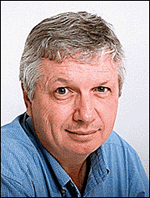


![]()
Talk Story
Hawaii’s aspirations
for high-technology
get a reality check
KALIHI boy, Iolani grad and high-tech guru, Guy Kawasaki, came to town this week to splash some real-world cold water on Hawaii's assumptions about growing a high-tech industry in the islands.Since 1999, Kawasaki has plowed through thousands of business plans to match up the best ideas and venture capital funding. His Garage Technology Ventures in Palo Alto, has found more than $310 million in backing for 79 projects, including $55 million just this year.
Kawasaki is Apple Computer's former Software Evangelist and a Silicon Valley insider who also knows and loves Hawaii.
His is tough love.
Tuesday evening at the University of Hawaii's architecture auditorium, Kawasaki shared his advice on high-tech development with an overflow crowd that included MBA candidates, tech heads, faculty members and perennial candidate Frank Fasi.
Hawaii has long pitched our telecommunications infrastructure, key global location and quality of life as reasons for companies to locate here. That's all wrong, Kawasaki said.
He pooh-poohed Hawaii's fiber-optic connections: "Bandwidth doesn't matter. It's available everywhere. Companies don't relocate to get bandwidth."
Moreover, "being half way between Hong Kong and New York means nothing. For high-tech companies Hawaii isn't a bridge between east and west." People fly direct; they don't need to stop in Hawaii anymore.
Hawaii's quality of life is wonderful, but isn't a compelling advantage, Kawasaki said. Life science experts flock to Minneapolis despite its long, cold winters and "mosquitoes the size of birds" in the summer because the Mayo Clinic is there. Climate isn't as important as being where the best life science ideas are.
We should look to Israel's example. That nation's entrepreneurs have successfully developed high-tech businesses spun off from the military research it does to survive. Despite Israel's quality-of-life disadvantages, "it's stunning what has happened there," Kawasaki said.
"And the mayor of Newark, New Jersey isn't going around saying 'Come to Newark because we're half way between San Francisco and Tel Aviv.'"
Entrepreneurs, not venture capital, come first, Kawasaki said. The aim of venture capital is "to make boatloads of money" and world-class business ideas will always attract investors. It doesn't work the other way around. Our primary focus should be cultivating people with good ideas not building a venture capital fund.
Kawasaki believes that most successful high-tech entrepreneurs come out of engineering schools and technology companies, not out of business schools. He said it's easier to teach engineers business than to teach MBAs science.
"It really is rocket science," he said. Technology isn't about selling pet food on the Internet anymore. The way to develop high-tech companies is to throw every dollar possible into building a world-class science and engineering faculty at UH. This will attract the talent that will generate ideas and start new businesses.
Paradoxically, Hawaii also needs to "allow our best kids to go away and be educated elsewhere," Kawasaki said. They can get a fine education here, of course, but there's more to be learned by going away and experiencing the world. Many will come back but if they don't, that's OK, too. AOL's Steve Case might live in Virginia, for example, but he's still doing a lot for Hawaii.
We must learn the rules of the game, Kawasaki said. The venture capital business is a closed community and it's important to become acquainted with the key players and learn how it's done.
For example, Kawasaki says he loves to come to Hawaii and speak, "but the call always comes about 10 days before the event -- I need about 10 months notice to schedule something like that," he said. "A free trip to Hawaii just doesn't do it."
Finally, Kawasaki advises Hawaii to do its own thing.
"I hope you don't think that in 1925 there was a governor's commission on Silicon Valley and that they appointed a bunch of hacks who got together and started Stanford University." The high-tech revolution wasn't planned, and Hawaii's goal shouldn't be to become another Silicon Valley.
"Aim higher," Kawasaki said.
John Flanagan is the Star-Bulletin's contributing editor.
He can be reached at: jflanagan@starbulletin.com.